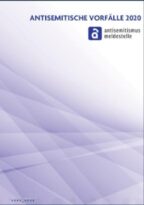Fonte:
https://eurojewcong.org/
Jewish Community of Vienna records highest ever number of antisemitic incidents in 2020
A total of 585 antisemitic incidents were reported to the Antisemitism Reporting Office of the Jewish Community in Vienna (IKG Wien).
Compared to the previous year, where there were 550 incidents, this represents an increase of 6.4%, making it the highest recorded number of antisemitic incidents since records began 19 years ago.
The report emphasises that these figures are not comprehensive account of antisemitism in Austria. This is because it only covers antisemitic incidents reported and classified as clearly being antisemitic in nature according to the IHRA working definition of antisemitism that were counted.
From the 585 incidents, there were:
- 11 physical attacks (2019: 6)
- 22 threats (2019: 18)
- 53 cases of property damage (2019: 78)
- 135 cases of Mass dissemination of antisemitic content / Literature (2019: 209)
- 364 cases of abusive behaviour (2019: 239)
“That is 585 antisemitic incidents too many”, said IKG President Oskar Deutsch. “For decades the Jewish community faced the problem of antisemitism largely on its own. Today, it’s different. Ever more people in Austria see Jewish life as an integral part of Austria and reject antisemitism. Nevertheless, a look into the daily reality of many Jews, as well as the latest figures show that there is still much work ahead.”
“The fight against antisemitism is not primarily the task of the Jewish community. But we are, naturally, the ones to experience it firsthand,” Deutsch added. “That is why the most important task of the antisemitism reporting office of IKG Wien is to look after the victims of antisemitic incidents.”
“What is crucial now is what consequences our society draws from this. It is up to each and every individual not to accept an antisemitic joke on the Internet, a conspiracy myth at a demonstration or in a school class, but to speak out against it,” Deutsch concluded.
In order to be able to compare statistics to other countries internationally, the report was based on the categorisation of reported antisemitic that is used in Germany (RIAS) and the United Kingdom (CST), as was the case in last year’s report.
The report notes that after a remarkable slump in reported cases at the beginning of the coronavirus pandemic, the numbers went back to normal again during the course of the year.
The year 2020 saw a spate of serious antisemitic incidents in Austria. The President of the Jewish community of Graz, Elie Rosen, was attacked on 23 August. This was followed by the terrorist attack of 2 November in and around Vienna’s Seitenstettengasse, in which four people were killed and 23 others were injured.
Concerning the attack the report states: “According to the authorities, it can be assumed that the Jewish community was also a target of the attacker. That he was successful is due to the fact that the premises of the IKG were already closed at the time of the attack, and that the restaurant next to the building complex did not open after a reservation was cancelled on short notice.”
Towards the end of the year there was also an attack on a rabbi on the street in Vienna, to whom none of the bystanders rushed to help. Finally, the year 2020 saw a proliferation of antisemitic conspiracy myths as well as inappropriate comparison to the Nazi era being made in the wake of the coronavirus pandemic.
“The latest annual report must serve a basis for adapting and strengthening measures [against antisemitism] in cooperation with all relevant stakeholders,” said IKG General Secretary Benjamin Nägele.
“The National Strategy Against Antisemitism has set an important framework to this end. The figures and 2020, as well as the latest developments, such as anti-lockdown demonstration must be regarded as an incentive for the implementation of the strategy,” Mr. Nägele concluded.


